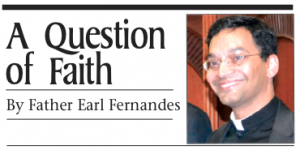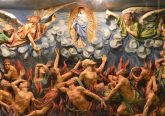Q&A: What is the purpose of the homily?
Dear Father: What’s the purpose of a homily? Is it to reflect on the scriptures, to teach or give catechism, to talk about the saint of the day or current events?
Dear Reader: The answer to your questions can be found in recent church documents. Your question deals with the function of the homily. First, we need to look at its context. Pope Francis (Evangelii Gaudium, 135) said that “The homily can actually be an intense and happy experience of the Spirit, a consoling encounter with God’s word, a constant source of renewal and growth.” Benedict XVI noted (Verbum Domini, 6): “The novelty of biblical revelation consists in the fact that God becomes known through the dialogue which he desires to have with us.”
Pope Francis also proposes this dialogical approach, situating the homily within its liturgical context (EG, 137): “The homily has special importance due to its eucharistic context: it surpasses all forms of catechesis as the supreme moment in the dialogue between God and his people which lead up to sacramental communion. The homily takes up once more the dialogue which the Lord has already established with His people.”
The Lord Jesus was a preacher. His first homily (Mark 1:14-15) was remarkably short: “Repent and Believe in the Gospel.” In Preaching the Mystery of Faith, the US Bishops point out, “All effective homilies have this sense of urgency and freshness, revealing the startling beauty and the promise of the Kingdom of God and of the Jesus who embodies it…” The homily intends to bring about conversion of heart and belief. The bishops continue: “A good homily is an occasion to find healing precisely through confidence in Christ Jesus.”
The bishops reflect on the disciples’ journey on the road to Emmaus, during which they encounter the Risen Lord (Luke 24:13-35). The homily should be like this dialogical encounter and journey, inflaming the heart and helping the faithful recognize Him in the “breaking of the Bread.” It is an encounter with the Risen Lord and, therefore, out to be deeply rooted in the Paschal Mystery. This encounter happens for real people in concrete situations; hence, the need to speak to current events and to be relevant: “First, the homilist is speaking to people, who are at least to some degree, searching for Jesus Christ and the meaning that the Gospel can give to their lives.”
Pope Francis reminds us what a homily is not (EG, 138): “The homily cannot be a form of entertainment like those presented by the media, yet it does need to give life and meaning to the celebration. It is a distinctive genre, since it is preaching situated within the framework of a liturgical celebration; hence it should be brief and avoid taking on the semblance of a speech or a lecture.”
While not a lecture, the homily can deal with doctrinal and catechetical issues. The U.S. Bishops point out that many of Paul’s letters, possibly preached in a liturgical context, touch upon doctrinal issues such as the identity of Jesus, the nature of and unity of the church, and even morality. The bishops state: “The doctrines of the church should direct the homilist and ensure that he arrives at and preaches about what is in fact the deepest meaning and sacrament for Christian life.”
Benedict XVI (Sacramentum Caritatis, 46), while noting that “the homily closely relates the proclamation of the word of God to the sacramental celebration and the life of the community, so that the word of God truly becomes the church’s vital nourishment and support”, writes that “The catechetical and paraenetic aim of the homily should not be forgotten.”
A homily should exhort and inspire the faithful, sometimes this can be done by reflecting on a liturgical text, feast or saints day. Regarding catechetical content, Benedict continues: “During the course of the liturgical year it is appropriate to offer the faithful, prudently and on the basis of the three-year lectionary, “thematic” homilies treating the great themes of the Christian faith, on the basis of what has been authoritatively proposed by the Magisterium in the four “pillars” of the Catechism of the Catholic Church…”
The General Instruction on the Roman Missal (65) directs that the homily “should be an explanation of some aspect of the readings from Sacred Scripture or of another text from the Ordinary or the Proper of the Mass of the day and should take into account both the mystery being celebrated and the particular needs of the listeners.” In short, I think the answer to your question is “All of the Above.”
Father Earl Fernandes is dean of Mount St. Mary’s Seminary and the Athenaeum of Ohio. To ask Father Earl a question about the Catholic faith, send an email to Steve Trosley.
This A Question of Faith column by Father Earl Fernandes originally appeared in the October 2015 print edition of The Catholic Telegraph.














